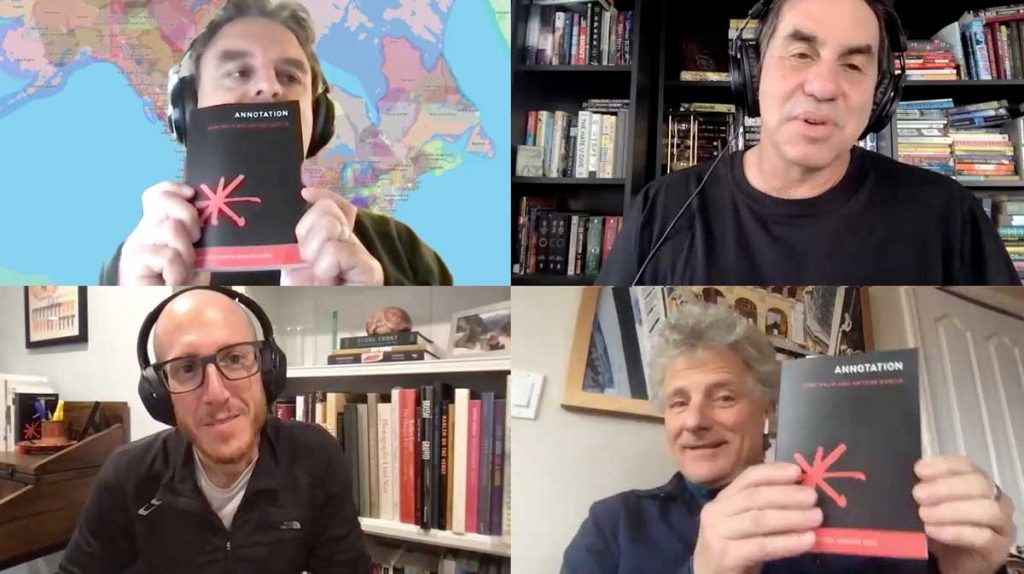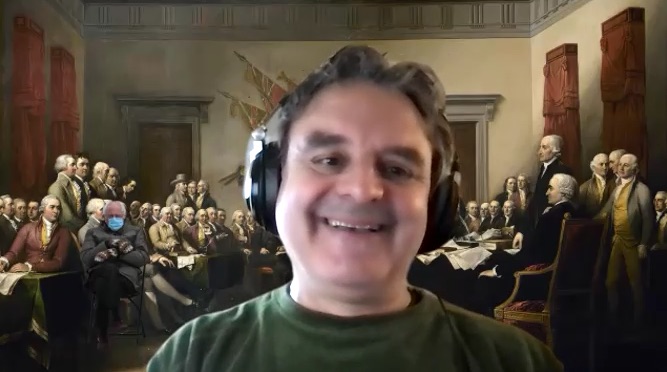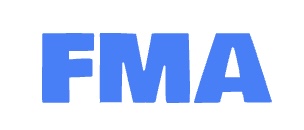Web annotation is on our minds at OE Global with our initiative to use this technology to add examples, commentary, and specificity to the UNESCO Recommendation on OER. That is why we were excited to have a conversation with one of the leading scholars of annotation, Remi Kalir.
An assistant professor of Education at University of Colorado Denver, Remi was a Scholar in Residence at Hypothesis, leader of the Marginal Syllabus project, and co-author with Antero Garcia of maybe The book on the topic titled Annotation published by MIT Press in 2021.
In this episode of OEG Voices we talked with Remi about the value of annotation, how it is something we do as an every day practice, and brainstormed what it could offer us in this effort to annotate this high level UNESCO document. This conversation included Nate Angell, Director of Marketing at Hypothes.is as well as Paul Stacey and Alan Levine from OE Global.

Podcast: Play in new window | Download
We started with Remi talking about his message of “you are an annotator” sharing a wide range of examples of things we do or see in our everyday lives that might be considered annotation and even makes a case that we see it as marks on public monuments. He has been increasingly thinking about public space, public imagery, and monuments acting as texts that are annotated.
Remi even makes a case (also in the Annotation book) that meme images, the addition of text to an image shared in social media, as a form of annotation. What makes memes work is that the context is understood, that people are in it together. What you cannot hear in the podcast is when in our zoom room, Nate flipped his background to an image of the signers of the Declaration of Independence with the addition of the popular seated image of Bernie Sanders, arms folded, wearing his blue mask.

Remi frames the act of annotation as one that” holds this really special place between reading and writing.” And he also notes that the barrier of entry for annotation is very low, that these are well known literary practices of reading and writing that most people are already fluent in.
Private book marginalia is cherished by a lot of people. It’s how people make meaning. It’s how they try to have conversations with ideas or the presumption of a conversation with the author. And yet a really interesting thing can happen when we can share texts. In the early book culture on England, Europe in the 1700 and 1800s people would commonly share books as the supply was low.
Remi Kalir
Remi describes how there was a shared understanding then that your notes in the margins was not just private and was being written not only for personal meaning making but also served as a sort of social interaction with your peers.
We had an interesting discussion of barriers to annotating that can be tied to the history of book ownership and book culture, and questioning if most people feel comfortable actually writing in books.
For some people, they might feel they are not quite ready to make a mark in the margins even privately or publicly. It’s important to open up different ways of participating, different kinds of avenues and pathways for people to read together, and to also potentially write together, and to see annotation was the valuable practice that brings those stances of readers and writers together.
Remi Kalir
We moved on to talking about the challenges and potential of our effort to engage educators in annotating the UNESCO Recommendation on OER set up as a Pressbooks version with the Hypothes.is annotation tools automatically enabled. As a chance to annotate together, we opened it up to focus on one specific section. Since you cannot see this in the podcast, here is an excerpt from the zoom session where we recorded this episode.
We found it interesting to talk about our approach in a shared setting as we were in the act of creating annotations.
Remi provided us some fabulous ideas for using social media to direct potential annotators to very specific sections, and idea we are using as a “going granular” approach to focus on just one of the five action areas in the Recommendation on OER.
He also shared a problem we never considered that he has seen in course settings– the problem of having so many annotations that the conversation gets over saturated. Listen to the episode to hear the eloquent way Remi turns this into an opportunity rather than a problem to be fixed.
He also suggests that a larger goal goes beyond collecting notes for this one particular document:
Consider that the process you are enacting through this is actually one you would want other people to replicate… to inspire people to reinvent this whole process for their own communities with their own texts for their own conversations.
Remi Kalir
There is much more to hear in this episode including how the “laneways” or alleys in Melbourne, Australia as places where graffiti is invited as public art might be a positive metaphor for web annotation, as well as the fascinating Book Traces project plus an example of how one person’s harsh criticism hand written into of a book of poetry by Charles Bukowski went wildly viral in twitter (opening up questions about what is public).
We appreciate so much the thoughtful wisdom Remi shared with us about annotation, such as:
This harkens back to some of the inspiring visions of annotation from decades ago whether it’s Vannevar Bush and others who looked at annotation really as the connective tissue, the associative trails, that we are brining together examples and evidence with text and do so in a way that is collaborative… that content is out there. The annotation is simply mediating people’s awareness and connection to that evidence.
Remi Kalir
We hope this conversation inspired you to be part of our first of several Three Days of Focus (and Annotation) on the action areas of the OER Recommendation. Remi has kindly agreed to drop into our open Annotation Lab, and we hope you take the opportunity to annotate along side him.
For a bonus, listen in to more from Remi from his visit to the Open Annotation Lab.
See Also
- Remi Kalir (his web site)
- Marginal Syllabus project
- Annotation (2021), by Remi Kalir and Antero Garcia, published by MIT Press
- Book Traces project
- Book Traces Nineteenth-Century Readers and the Future of the Library by Andrew M. Stauffer
- Bukowski poem annotations shared in twitter
- Hypothes.is (learn more about web annotation)
- OE Global’s Annotating the OER Recommendation project
- Annotating the UNESCO OER Recommendation (Pressbook with Hypothes.is web annotation available)
- Let’s Annotate the OER Recommendation… Together (guide in OEG Connect)
- Three Days of Focus on Annotation (series of events / activities in OEG Connect)















